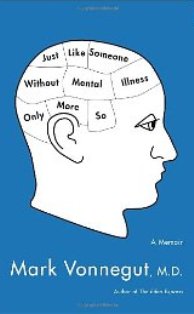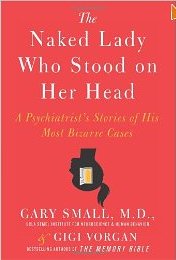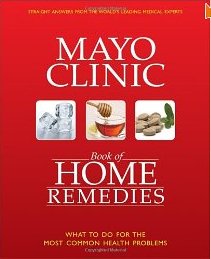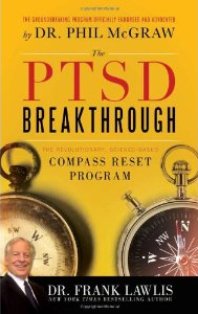
November 16th, 2010 by Dinah Miller, M.D. in Better Health Network, Book Reviews
Tags: Bipolar Disorder, Doctor's Personal Life, Dr. Dinah Miller, Dr. Mark Vonnegut, Life Stories, Like Someone Without Mental Illness Only More So, Mental Health, My Three Shrinks, Pediatrician, Psychiatry and Psychology, Psychotic Illness, Schizophrenia, Shrink Rap
No Comments »


 I’ll cut to the chase: I loved this book. Five stars. Two thumbs up.
I’ll cut to the chase: I loved this book. Five stars. Two thumbs up.
When I read books, especially psychiatry books that I write about on Shrink Rap, I often read more carefully and sometimes more critically. I was so immersed in reading “Just Like Someone Without Mental Illness Only More So” that I didn’t stop to think, I just went on the journey.
Mark Vonnegut is a pediatrician and the son of my favorite author when I was in junior high school. His memoir is a poignant and candid account of his struggles with, well, life in general, and life with a psychotic illness in particular. Schizophrenia, bipolar disorder — who knows? (I’ll vote for bipolar disorder.) Some illness where he had three episodes in his twenties, then another episode 14 years later.
Thorazine and lithium and megavitamins and psych wards. Xanax and alcohol and how humiliating it is to be psychotic on a stretcher in the ER hallway of the hospital where he works. Divorce and remarriage. First and second families. Childhood as the son of a financially struggling, not-yet-famous eccentric writer, and adulthood as the son of an icon. Vonnegut is a hippy, a mainstream doctor, a middle-aged softball player, then finally a guy who accidentally poisons himself with wild mushrooms. Read more »
*This blog post was originally published at Shrink Rap*
October 17th, 2010 by Dinah Miller, M.D. in Better Health Network, Book Reviews, Opinion, True Stories
Tags: Dr. Dinah Miller, Dr. Gary Small, Friends Treating Friends, General Medicine, Medical Professionalism, Medical Treatment Of Friends, My Three Shrinks, Professional Boundaries, Professional Judgment, Professionalism In Healthcare, Psychiatry and Psychology, Shrink Rap, The Naked Lady Who Stood On Her Head
No Comments »


 I just finished reading Dr. Gary Small’s book, The Naked Lady Who Stood On Her Head.
I just finished reading Dr. Gary Small’s book, The Naked Lady Who Stood On Her Head.
In the final chapter of the book, Dr. Small talks about his mentor, friend, and father figure who’s mentioned throughout the book. The mentor approaches him on the golf course, where they meet to talk, and says he needs psychotherapy and Small is the man to do it. The author is surprised, hesitant, and a bit uncomfortable with the demand (it comes as more than a request.) His wife likens it to the need for a plumber or a dentist, and Dr. Small takes on the task. The mentor calls all the shots: Where the meetings will be, what pastry they will eat, the form of his payment. The author initially misses the diagnosis and uses this as an example of how one can be blinded.
So is it okay for a friend to treat a friend? Read more »
*This blog post was originally published at Shrink Rap*
October 7th, 2010 by Harriet Hall, M.D. in Better Health Network, Book Reviews, Health Tips, Opinion
Tags: Acupuncture, CAM, Chiropractic, Common Health Problems, Complementary And Alternative Medicine, Dietary Supplement, Dr. Harriet Hall, Energy Medicine, Evidence-Based, Herbal Remedies, Home Reference Book, Homeopathy, Mayo Clinic Book of Home Remedies, Quackademic Medicine, Science Based Medicine, Woo-Free
No Comments »

 I write a lot of critical articles. It’s nice to be able to write a positive one for a change. I received a prepublication proof of The Mayo Clinic Book of Home Remedies: What to Do for the Most Common Health Problems. It is due to be released on October 26 and can be pre-ordered from Amazon.com. Since “quackademic” medicine is infiltrating our best institutions and organizations, I wasn’t sure I could trust even the prestigious Mayo Clinic. I was expecting some questionable recommendations for complementary and alternative medicine (CAM) treatments, but I found nothing in the book that I could seriously object to.
I write a lot of critical articles. It’s nice to be able to write a positive one for a change. I received a prepublication proof of The Mayo Clinic Book of Home Remedies: What to Do for the Most Common Health Problems. It is due to be released on October 26 and can be pre-ordered from Amazon.com. Since “quackademic” medicine is infiltrating our best institutions and organizations, I wasn’t sure I could trust even the prestigious Mayo Clinic. I was expecting some questionable recommendations for complementary and alternative medicine (CAM) treatments, but I found nothing in the book that I could seriously object to.
It is organized alphabetically, starting with acne and airplane ear and progressing through bedbugs, boils and bronchitis, dandruff, depression and diabetes to warts, wrinkles and wrist pain. Each entry consists of (1) a description of the problem and its symptoms, (2) treatments you can try at home, and (3) when to seek professional medical help. It concludes with a short section on emergency medicine that covers anaphylaxis, bleeding, burns, CPR, choking, fracture, heart attack, poisoning, seizure, shock and stroke.
Nowhere does it mention acupuncture, chiropractic, energy medicine, or homeopathy. It gives good, clear guidance about when a health problem should not be treated with home remedies. Its recommendations about diet and exercise are solid. It doesn’t recommend anything that can’t be supported by published studies and common sense. When it recommends herbal remedies and dietary supplements, it is cautious about what it claims. For instance, glucosamine and chondroitin are listed for osteoarthritis, but they point out that further study is required and they say “because the supplements may help and appear to be safe, it may not hurt to give them a try.” Not exactly a strong recommendation. Read more »
*This blog post was originally published at Science-Based Medicine*
September 23rd, 2010 by Harriet Hall, M.D. in Better Health Network, Book Reviews, Opinion, Quackery Exposed, Research
Tags: Brain Damage, Dr. Frank Lawlis, Dr. Harriet Hall, Dr. Phil, Evidence-Based, Mental Health, Neurology, Post-Traumatic Stress Disorder, Psychiatry and Psychology, PTSD, Real Science, Science Based Medicine, Science-Based Evidence, The Doctors, Traumatic Brain Injury
3 Comments »

 It infuriates me when someone misappropriates the word “science” to promote treatments that are not actually based on science. I have just read a book entitled The PTSD Breakthrough: The Revolutionary Science-Based Compass RESET Program by Dr. Frank Lawlis, a psychologist who is the chief content advisor for Dr Phil and The Doctors. There is very little science in the book and references are not provided. It amounts to an indiscriminate catalog of everything Dr. Lawlis can imagine that might help post-traumatic stress disorder (PTSD) patients.
It infuriates me when someone misappropriates the word “science” to promote treatments that are not actually based on science. I have just read a book entitled The PTSD Breakthrough: The Revolutionary Science-Based Compass RESET Program by Dr. Frank Lawlis, a psychologist who is the chief content advisor for Dr Phil and The Doctors. There is very little science in the book and references are not provided. It amounts to an indiscriminate catalog of everything Dr. Lawlis can imagine that might help post-traumatic stress disorder (PTSD) patients.
He describes recent brain imaging studies suggesting that signs of traumatic brain injury are associated with PTSD. He thinks PTSD can no longer be considered a psychological condition, but must be approached as a complex biological, physical, psychological, and spiritual condition. He says many of these patients have brain damage. Read more »
*This blog post was originally published at Science-Based Medicine*
August 28th, 2010 by Medgadget in Better Health Network, Book Reviews, Opinion, Research
Tags: Bonk, Curious Science of Life in the Void, Dan Buckland, History of Cadaver Research, History of Sex Research, Mary Roach, Medical Research in Spaceflight, NASA, National Space Biomedial Research Institute, NSBRI, Packing For Mars, Space Programs, Space Travel, Stiff
No Comments »


Book review by Dan Buckland
(Dan Buckland is an editor at Medgadget and an MD/PhD student at Harvard Med/MIT whose thesis deals with diagnosing back injury in spaceflight using ultrasound.)
Mary Roach, author of previous entertaining books Bonk (a history of sex research) and Stiff (a history of cadaver research), has turned her considerable talents in translating decades of research into a readable review of human (and animal) spaceflight experimentation.
The title of her new book, Packing for Mars: The Curious Science of Life in the Void, is a bit of a misnomer — only the last chapter is devoted to the medical advances needed for a trip to Mars. However, it is a great layman’s history of the biomedical results of both the American and Russian space programs.
Through my own research and academic career I’ve been peripherally involved with many of the recent studies she mentions in the book, and I know many of the people she interviewed, so I give her credit for taking some fairly complicated concepts and distilling them to relevant anecdotes and asides. Read more »
*This blog post was originally published at Medgadget*

 I’ll cut to the chase: I loved this book. Five stars. Two thumbs up.
I’ll cut to the chase: I loved this book. Five stars. Two thumbs up.






 It infuriates me when someone misappropriates the word “science” to promote treatments that are not actually based on science. I have just read a book entitled
It infuriates me when someone misappropriates the word “science” to promote treatments that are not actually based on science. I have just read a book entitled 









